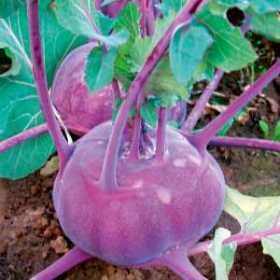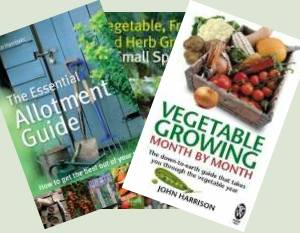How to Grow Kohlrabi – A Guide to Growing Kohlrabi
 Kohlrabi
Kohlrabi
Kohlrabi originates in the middle east and came to Europe with Crusaders returning from the Holy Land. When we’ve been in French supermarkets we’ve seen Kohlrabi for sale but never in Britain.
In fact, although most gardening books mention it, I’ve hardly ever seen people growing it on allotments. I’ve had comments that ‘those turnips have bolted or gone wrong‘ from experienced growers who have never seen it before.
Yet once you grow it the chances are you’ll be hooked. It’s one of the easiest crops to grow, fast to produce and tolerant of poor soil and dry weather. The flavour isn’t too strong, a sort of cross between cabbage and turnip although raw it has overtones of celery which isn’t to everyone’s liking.
The secret of kohlrabi is to harvest it when the bulb is just the size of a cricket ball. As it grows larger it becomes tough and woody which is where some have gone wrong trying to cook a wooden football.
Sowing and Growing Kholrabi
Although a brassica, kohlrabi is not demanding of the soil and will thrive on soils too poor for swedes and turnips. They are drought resistant but they don’t like too much water. If it’s a monsoon summer, grow in raised beds or on raised rows.
Like all brassicas, they prefer a high pH , 6.00 or above.
- Successionally sow directly into the soil in late April through to mid-August at 1 cm (½ inch) deep, in rows 30 cm (12 inches) apart.
- Thin to 15 cm (6 inches) apart, or just 8 cm (3 inches) if growing in a pot.
- Harvest at cricket ball size after about 8 to 10 weeks
When thinning, the thinnings can be transplanted to extend the row. The shock will slow them down so spacing each sowing’s results over 4 weeks.
Pests and Problems with Kohlrabi
Kohlrabi is a brassica and can be affected by clubroot or sometimes cabbage root fly or flea beetle. Usually, however, they’re trouble free and very easy to grow.
Varieties of Kohlrabi
Kolibri F1 Seeds – This superb kohl rabi will provide a good harvest of attractive, flavoursome purple bulbs. Plants hold well in the garden. In flavour, midway between cabbage and turnip, the edible portion is the swollen stem just above soil level. Best eaten at ‘golf-ball’ size.
Lanro Seeds – White, apple-like bulbs of high-grained internal structure and of delicate flavour. Higher yielding and standing longer in good condition than ‘ordinary’ varieties.
Harvesting and Eating Kohlrabi
Once the bulbs, which are actually swollen stem rather than root, are developed to golf ball size but not more than tennis ball sized, lift and trim off the roots and leaves. The leaves are edible and should be treated like spinach.
The bulbs can be grated and eaten raw in salads but are more commonly cooked. Scrub clean, much of the nutty flavour of kohlrabi is in the skin so do not peel. You can boil whole or sliced or diced for around 20 minutes.
Serve with a white sauce or melted butter. They can also be mashed with butter or sour cream, black pepper and a little salt.
Cubes or slices can be served cold with a mayonnaise like a potato salad. Boiled and sliced, try lightly seasoning, dipping in beaten egg and coated with breadcrumbs. Then fry until the crumbs are browned and serve as fritters.




